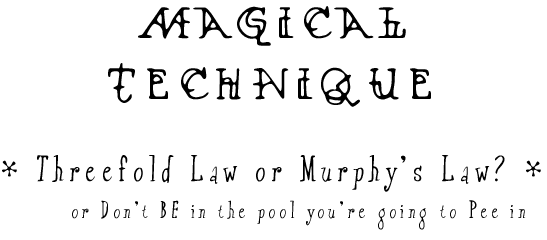 |
 The Law of Return and the Ripple Effect in Closed Systems
Magic as a science depends upon the mage knowing exactly what will happen as a result of his actions. The most important part of knowing this is keeping a record of magical work done, especially recording exactly what was *said* during the ritual as the intent. That way, he can look back later and compare what happened with what was actually said, and the often humorous consequences can determine how his practices should be rectified for further use. This is as close to "ethics" as I like to get. When a spell is cast, the mage's will emits a wave (if you will) outward from himself, calibrated to seek the vibration of a specific target. Upon reaching this target, the wave delivers its payload (if you will), causing a certain amount of change in the target. No act of will can ever be fully neutralized if properly targeted--something always happens, although it might not be what was originally intended. The Ripple Effect comes into play when the target has been struck by the mage's will and thus has been influenced to deviate from its natural course. While this result might be exactly what the mage was willing to have happen, the consequences of that result might not be pleasant to him. Each action should be carefully thought out, perhaps even using divination for "outside" speculation--"What would happen if I really DID this?" "Suppose it DID happen for me--what then?" Would would it mean to have gotten your way, outside of the primary goal itself? Would having influenced your world create a more pleasant whole or a worse one? The mage would be wise to speculate third and fourth generation effects of any magical action he desires to take, BEFORE taking it. When working with targets in close proximity to the mage (ie one's boss, family or live-in), he should choose carefully what sort of manipulation he wishes to have performed in his immediate vicinity. Being in close proximity to the target of a "pulse" of will is not always recommended if the result is something the mage does not wish to experience closely. For example, it's not a good idea to force your boss to give you a raise unless raises are already being handed out. This is because the spell would force your boss to rescind his prior judgement, or perhaps cloud his judgement entirely, and do you want someone impaired managing the company you work for? This is the same reason why it's not a good idea to cast love spells on anybody--do you really want the love of someone whose will and judgement have already been made insensible? Seduction spells are in no way subject to this sort of call, since sex and love are two distinct objectives. Furthermore, the more a mage emits a certain type of will, the more he will find that exact influence in his life. "All the world loves a lover", as they say. This holds true of any form of regular practice or even obsession. The mage who lives for magical combat will never find himself short of enemies, and neither will the mage who lives for new lovers. The mage who wills for riches will find himself beseiged by opportunities of varying quality, and the mage who summons demons will never be alone. In "open" systems, the mage is free to act as he will since the target of his will is far enough away from himself as to be little or no immediate threat to his personal stability. Most importantly, the mage should always remember that his world is literally what he makes it.




|
 |
 |
